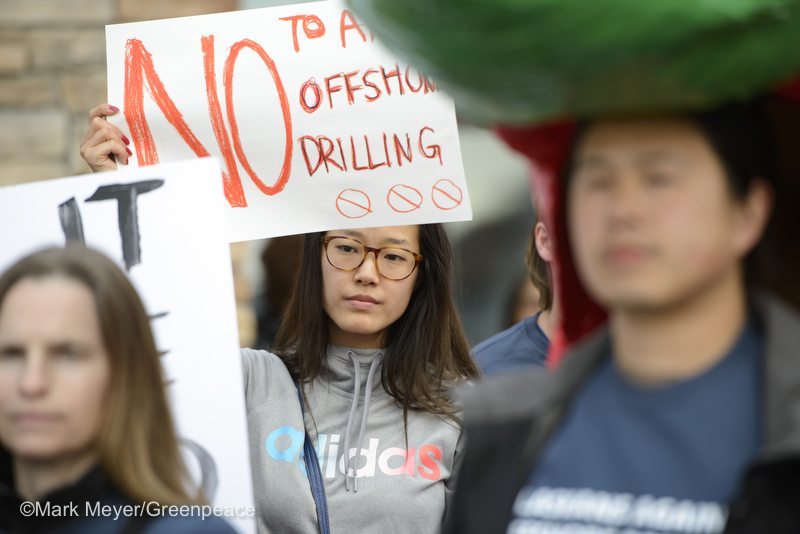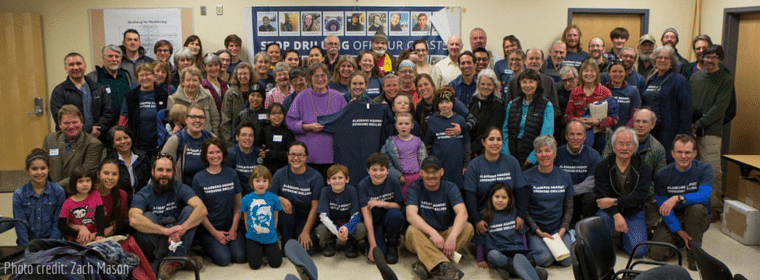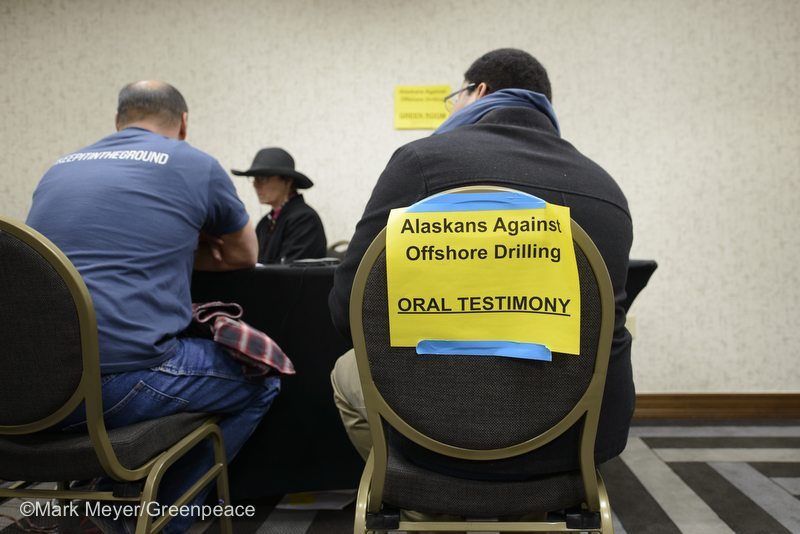Over the past week, people from villages along Alaska’s North Slope, as well as Anchorage and Fairbanks, have been crowding public hearings on the potential future of Alaskan offshore drilling.
The Bureau of Ocean Energy Management (BOEM) — the Department of Interior agency responsible for regulating offshore oil and gas development — has been holding these hearings to gauge public interest, and hundreds of Alaskans have told them, flat out, no.
On Monday night in Fairbanks, about 100 people showed up to express their opposition to offshore drilling.
They arrived before the hearing in t-shirts that said “Keep It In the Ground,” and then crammed into a classroom-sized space next to the main meeting area. Pretty soon, the room was warm from all the people — many of whom had to stand around the edges to hear their neighbors speak their concerns about drilling in the Arctic Ocean.
Bernadette from Fort Yukon is here because of her children. We need to keep our air and water clean! #ActOnClimate pic.twitter.com/y6txYXXbgR
— NorthernCenter(NAEC) (@NorthernCenter) April 5, 2016
On Tuesday afternoon in Anchorage, Alaskans opposed to drilling rallied outside the meeting venue, complete with colorful wildlife costumes and signs, spirited chants, and speeches from folks who traveled in from around the gigantic state to testify to the risks of drilling.
They were parents who want a safe future for their small children. They were university students, local churchgoers, Alaska Native residents with roots and family in coastal villages and the state’s interior. And they were all there to say what it is like to be on the frontlines of climate change and the risk of an oil spill.
Alaskans rally against new offshore oil leases at fed hearing in Anchorage. #nonewleases #keepitintheground pic.twitter.com/NLeebIYRdm
— Ctr4BioDiv Oceans (@EndangeredOcean) April 6, 2016
There was an Iñupiat father who wants his children to eat safe muktuk as he has his whole life. Local leaders from the Native villages of Shishmaref and Kivalina testified that they fear they will soon have to leave their homes because their land is experiencing climate-induced erosion.
An anthropologist spoke about the risks to fish populations and the impact declining numbers will have on communities that rely on them. There was a Gwich’in mother who talked about the climate impacts on the land in the interior and the obligation we have to future generations.
And there was Kory Blake, a third-generation fisherman from Cordova who survived the Exxon-Valdez oil spill of 1989 and came to testify.
“Twenty-seven years later, our herring stocks have still not recovered,” Kory told the crowd in Anchorage. He told me about the psychological and societal impacts the spill had on his home — lost livelihood for thousands, depression and suicides in the face of devastating economic loss and community identity, thousands of residents moving away for good.
"27 years later, the herring are still gone." – Kory Blake, fisherman and Exxon-Valdez spill survivor pic.twitter.com/KLXjGEskOZ
— Greenpeace USA (@greenpeaceusa) April 6, 2016
Woven into these stories was a palpable sense of hope.
“For Fairbanks, a community where 70 cents of every dollar comes from extractive industry, the public opposition to yet another fossil fuel project provides hope for a transition to a clean energy economy,” says Jessica Girard, program director at the Northern Alaska Environmental Center.
“Our local legislators have a lot of work to do to get us off this historic dependence, but this week Alaskans have asked the Obama Administration to encourage that transition by removing all Alaska offshore leases.”
The government wants to hear from all Americans on this issue. Now it’s your turn to stand in solidarity with Alaskans as well as residents of the Gulf of Mexico who are facing the same fight.
Send President Obama a message: no new drilling in U.S. waters.

























